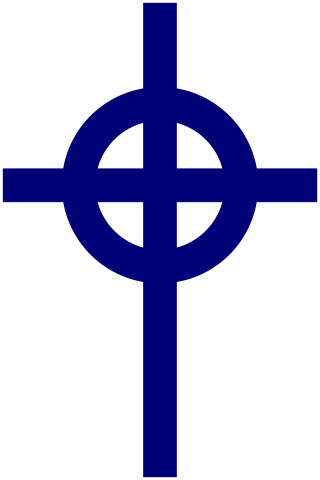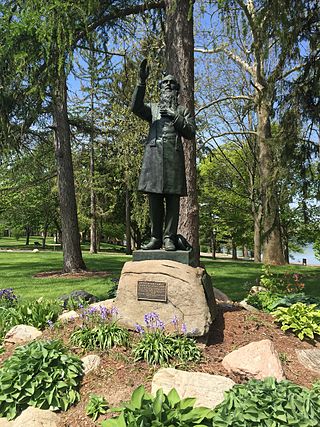Jay P. Dolan (March 17, 1936 to May 7, 2023) was an American historian and Catholic priest who specialized in the history of Catholicism in the United States. He spent almost his entire career at the University of Notre Dame (1971 to 2003), where he founded and directed the Cushwa Center for the Study of American Catholicism (1977 to 1993)
Dolan was born in the Irish American community in Bridgeport, Connecticut, to Joseph T. and Margaret (Reardon) Dolan, . He graduated from Fairfield College Preparatory School. He was ordained a priest in Rome in 1961 and earned his licentiate in sacred theology from the Pontifical Gregorian University in Rome in 1962. He then served in several parishes in the Diocese of Bridgeport. In 1966, he enrolled as a doctoral student at the University of Chicago Divinity School, where he studied under the Martin E. Marty. His research emphasized the men and women who occupied the pews rather than the pulpits. He earned a Ph.D. in history in 1970. His dissertation was published as The Immigrant Church: New York Irish and German Catholics, 1815–1865 (Johns Hopkins UP, 1975), and was awarded the John Gilmary Shea Prize by the American Catholic Historical Association in 1976. He left the priesthood and married Patricia McNeal in 1973. They had two children. [1]
Dolan was a member of the history department at Notre Dame from 1971 to his retirement in 2003. He taught courses in American Catholic history, American religious history, immigration history, and Irish American history. He founded and directed the Cushwa Center for the Study of American Catholicism (1977 to 1993). Dolan was elected President of the American Catholic Historical Association in 1995. In 2007 he received the Catholic Library Association’s Jerome Award for outstanding contributions to Catholic scholarship. [2]
Regarding In Search of an American Catholicism: A History of Religion and Culture in Tension, Thomas W. Josziewicz wrote in the Catholic Historical Review that:
Throughout his survey, the author works five themes: democracy, devotional style, questions of nationality, the Americanization of Catholic doctrine, and gender. The primary narrative context is in fact the developing, indigenous democratic culture in the United States since the end of the American Revolution, and the entry of an apparently foreign Roman Catholicism into this largely Protestant republic, an entry that was not always so easy, nor so acceptable to the majority of an oftentimes apprehensive native population. [3]
According to Martin E. Marty:
In any evaluation of the generation that furthered the study of American Catholic history toward the turn of the millennium, Dolan has been a leader recognized across the map of the profession and beyond it. His writing, his teaching, his service as president of the two main associations in our craft, and his pioneering work at the Cushwa Center poised him well for his central role. [4]

With 23 percent of the United States' population as of 2018, the Catholic Church is the country's second largest religious grouping, after Protestantism, and the country's largest single church or Christian denomination where Protestantism is divided into separate denominations. In a 2020 Gallup poll, 25% of Americans said they were Catholic. The United States has the fourth largest Catholic population in the world, after Brazil, Mexico, and the Philippines.

Irish Catholics are an ethnoreligious group native to Ireland whose members are both Catholic and Irish. They have a large diaspora, which includes over 36 million American citizens and over 14 million British citizens.

Orestes Augustus Brownson was an American intellectual and activist, preacher, labor organizer, and noted Catholic convert and writer.

Anti-Catholicism is hostility towards Catholics and/or opposition to the Catholic Church, its clergy, and/or its adherents. At various points after the Reformation, some majority Protestant states, including England, Prussia, Scotland, and the United States, turned anti-Catholicism, opposition to the Pope (anti-Papalism), mockery of Catholic rituals, and opposition to Catholic adherents into major political themes and policies of religious persecution. The anti-Catholic sentiment which resulted from this trend frequently led to religious discrimination against Catholic communities and individuals and it occasionally led to the religious persecution of them Historian John Wolffe identifies four types of anti-Catholicism: constitutional-national, theological, popular and socio-cultural.

Edward Frederick Sorin, C.S.C. was a French-born priest of the Congregation of Holy Cross and the founder of the University of Notre Dame in Indiana and of St. Edward's University in Austin, Texas.

John Dawson Gilmary Shea was a writer, editor, and historian of American history in general and American Roman Catholic history specifically. He was also a leading authority on aboriginal native Americans in the United States. He is regarded as the "Father of American Catholic History".

Richard Peter McBrien was a Catholic priest, theologian, and writer, who was the Crowley-O'Brien Professor of Theology at the University of Notre Dame in South Bend, Indiana, U.S. He authored twenty-five books, including the very popular Catholicism, a reference text on the Church after the Second Vatican Council.
Members of the Catholic Church have been active in the elections of the United States since the mid 19th century. The United States has never had religious parties. There has never been an American Catholic religious party, either local, state or national.
Anti-Catholicism in the United States concerns the anti-Catholic attitudes first brought to the Thirteen Colonies by Protestant European settlers, composed mostly of English Puritans, during the British colonization of North America. Two types of anti-Catholic rhetoric existed in colonial society and they continued to exist during the following centuries. The first type, derived from the theological heritage of the Protestant Reformation and the European wars of religion, consisted of the biblical Anti-Christ and the Whore of Babylon variety and it dominated anti-Catholic thought until the late 17th century. The second type was a variety partially derived from xenophobic, ethnocentric, nativist, and racist sentiments and distrust of increasing waves of Roman Catholic immigrants, particularly from Ireland, Italy, Poland, and Mexico. It usually focused on the pope's control of bishops, priests, and deacons.
John Tracy Ellis was a Catholic Church historian and priest, born and raised in Seneca, Illinois, USA.

The Catholic Church in the United States began in the colonial era, but by the mid-1800s, most of the Spanish, French, and Mexican influences had demographically faded in importance, with Protestant Americans moving west. However after 1840, Catholicism grew through immigration from Europe, especially from Germans and Irish. After 1890, Catholic immigrants from Southern and Eastern Europe arrived in large numbers. The Church set up an elaborate infrastructure, based on local parishes organized into dioceses run by bishops appointed by the pope. Each diocese set up a network of schools, colleges, hospitals, orphanages and other charitable institutions. Many priests and nuns arrived from France and Ireland. By 1900, America was producing a sufficient supply of priests and nuns. The Catholic population was primarily working-class until after World War II when it increasingly moved into white-collar status and left the inner city for the suburbs. After 1960, the number of priests and nuns fell rapidly and new vocations plunged. However, the Catholic population was sustained by a large influx from Mexico and Central America. As the Catholic colleges and universities matured, questions were raised about their adherence to orthodox Catholic theology. After 1980, the Catholic bishops became involved in politics, especially on issues relating to abortion and sexuality.
In 1800 the Catholics were a small minority everywhere except Maryland. Immigration from Ireland and Germay gave them millions of adherents from the 1840s to the 1880s. Then came millions more from Italy, Poland and Eastern Europe, as well as French Canada. Large numbers of priests and nuns came from Ireland and France. The Irish soon dominated the clergy church, with a great majority of bishops by 1900. As the immigrants arrived new parishes and diocese were created. Rebuffed in efforts to obtain government funds for schools, the Catholics set up a parochial school system largely staffed with nuns. It reached about a third of the children. They also set up colleges. There were few Catholics in the South, apart from Louisiana. However they were well represented in the nation's cities, mill towns and mining centers. Anti-Catholic politics flared briefly in the 1850s, but the Catholic voters surged into the Democratic Party and Irish Catholic politicians played increasingly doiminant roles in Democratic machines in Boston, New York, and other major cities. Devotional practices included daily rosary prayers, regular attendance at Sunday Mass, and special roles for devotion to the Blessed Virgin Mary and favorite saints.
American Catholic literature emerged in the early 1900s as its own genre. Catholic literature is not exclusively literature written by Catholic authors or about Catholic things, but rather Catholic literature is "defined [...] by a particular Catholic perspective applied to its subject matter."
Father Peter Matthias Abbelen was the Roman Catholic vicar general of the Milwaukee Archdiocese and later the spiritual director for the School Sisters of Notre Dame in Milwaukee. Abbelen was born in Germany but moved to the United States.
The History of Catholic Education in the United States extends from the early colonial era in Louisiana and Maryland to the parochial school system set up in most parishes in the 19th century, to hundreds of colleges, all down to the present.

Irish Americans are ethnic Irish that live in the United States and are American citizens. Most Irish Americans today are descendants from immigrants who moved into America during the 19th century. Currently, there are about 36 million ethnic Irish who reside in the United States, making the third largest ancestry group, first being German-Americans and second Mexican-Americans respectively.

Chaplain Corby of Gettysburg is an outdoor sculpture by American artist Samuel Murray (1869–1941). It is located on the University of Notre Dame campus, and is owned by the University. The sculpture, made of bronze and limestone, depicts Father William Corby giving absolution to soldiers at the Battle of Gettysburg.

Robert Scott Appleby is an American historian, focusing in global religion and its relationship to peace and conflict, integral human development, and comparative modern religion. He is a Professor of history at the University of Notre Dame, and currently the Marilyn Keough Dean of the Keough School of Global Affairs.

John William O'Malley was an American academic, Catholic historian, and Jesuit priest. He was a University Professor at Georgetown University, housed in the Department of Theology and Religious Studies. O'Malley was a widely published expert on the religious history of Early Modern Europe, with specialities on the Council of Trent, the Second Vatican Council, and the First Vatican Council.
Ulrich L. Lehner is the Warren Foundation Professor of Theology at the University of Notre Dame. He is a trained philosopher, theologian and historian.